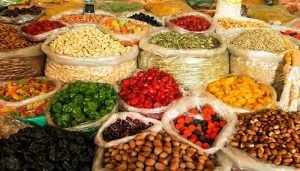
TBILISI, GEORGIA - JUL 18: Sale of agricultural products on central food market, Jul 18, 2011 in Tbilisi, Georgia. Suitable for farming areas account only for 16% of total territory of the country.
Around half of Nigerian workers who earn the minimum wage in the country allocate their entire income towards covering their fundamental food requirements.
This is according to a survey conducted by SBM Intelligence, a Nigerian geopolitical intelligence platform, and published on their website to highlight Nigeria’s escalating inflation and other macroeconomic challenges.
The findings indicated that those earning the minimum wage struggle to keep pace with the country’s inflation, resulting in a situation where necessities like food are becoming progressively more costly while wages remain stagnant.
Nigerians have been contending with a notable surge in food costs, leading to a considerable proportion of the population’s earnings being directed towards food expenditures.
The report provides insights that reveal a significant portion of minimum wage earners allocate their entire income toward food expenses, and many have resorted to reducing their spending or relying on loans to make ends meet.
The report reads that 49% of people earning less than the N30,000 minimum wage spend all their income on food, while 47% of those earners between N31,000 and N50,000 spend their entire income on food. 47% of all the respondents said they had to cut back on spending, while another 27% said they now use loans to keep up with their expenses.
The country has grappled with volatile oil prices, inflation, and various macroeconomic difficulties, which have led to decreased incomes for many Nigerians.
It would be recalled that Nigeria’s National Bureau of Statistics (NBS) reported that the country’s inflation rate in September rose to 26.72%, mainly driven by escalating food prices, marking a 0.92% increase compared to the previous month.
This is part of an ongoing trend where inflation rates have continued to climb, with each month setting a new record for the highest inflation rate.
The SBM Intelligence report closely aligns with a study published in August 2023 by Picodi Research, an international e-commerce organisation, indicating that Nigerians typically allocate around $62 (approximately N49,600 at an official rate of N800/$) monthly towards their food expenditures.








